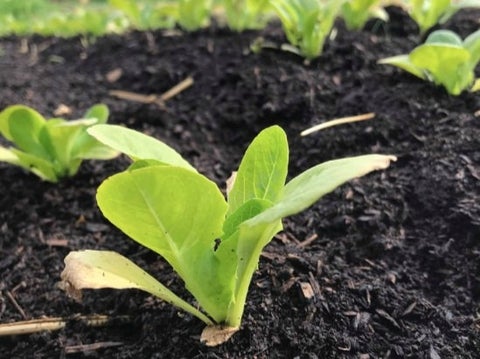Knowledge and identity
Indigenous identity is rooted in the Land. This identity is found through land-based relationships by observing, communicating with, understanding and learning from the Land. Growing food is one form of direct communication and forming an intimate Land connection, reinforcing our identity and relationship with the Land and informing how to live. Dave Skene (as quoted in Martin Luther University College’s Circle of Dialogue), 2020

Wisahkotewinowak Produce Gardens, Waterloo, ON
“How am I connected to the Land? How am I drawing my identity from the Land? Growing food [is] a part of the answer”
Engaging and communicating with the Land is the only way to nurture the Land relationships. This can be hard in an urban centre like Waterloo. It important to Indigenous people to participate in their traditional practices and teach the next generation these skills, knowledge, and values. The following are some ways to engage in Land and food-based practices:
Cultural values
The Seventh Generation Principle is a Haudenosaunee philosophy that we stand in the middle of seven generations before and after us. This means honoring our ancestors seven generations before us and making sustainable decisions today to create a world for the next seven generations to be able to thrive in. Indigenous Corporate Training Inc., 2020.

Stories and lessons
The legend of the Three Sisters is an ancient and well-known Iroquois story teaching about planting gardens.
The Three Sisters, or the trio of crops that are planted together, from oldest to youngest are:
- Corn -- takes up nitrogen, and supports beans by being a structure for them to climb
- Beans -- fixes nitrogen to fertilize the soil, holds sisters close together with her tendrils
- Squash -- users her large leaves and prickly vines to retain soil moisture and protect from insect predation
When planted together, these crops create the best conditions for each other to thrive just by being the best version of themselves. In the legend, the three vegetables were gifts from the gods, and physically and spiritually sustained the Indigenous people by being grown together, eaten together, and celebrated together.
Wisahkotewinowak's Three Sisters Garden
In 2017, Wisahkotewinowak Urban Indigenous Garden Collective established a Three Sisters Garden on Steckle Heritage Farm in Kitchener, Ontario. The 2500 square-foot plot contains the Three Sisters along with tobacco, sunflowers, and other assorted produce.
Three Sisters, or Tey’o’nhekwen in the Haudenosaunee language, were an essential component of the Haudenosaunee's agricultural systems when first establishing roots in their Territories.
Collectively, from the seeds to the plants to the energy they provide, the Three Sisters is referred to as "Our Sustenance"
- Corn is referred to as the “cultural centre of Haudenosaunee way of life.”
- When dried, these foods provided nutrients and long and easy storage
- The Sisters teach cultural concepts of sustainability and interdependence.

